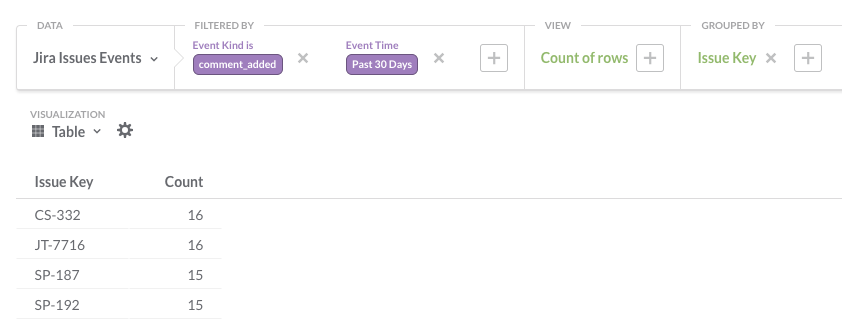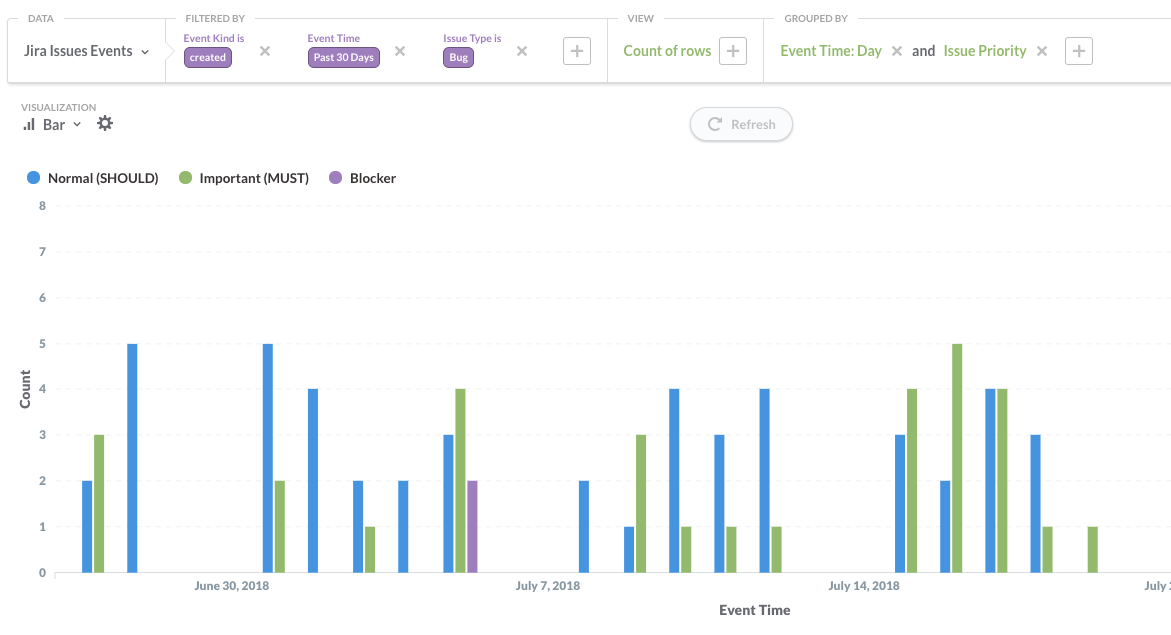The goal of this project is to enable teams using Jira to perform analyses on Jira projects through a SQL database, enabling the use of user-friendly tools like Metabase, more powerful ones like Superset or even advanced data analysis toolsets (Python, R...).
You can this project in conjunction with the Kaizenizer project for advanced metrics and visualization like lead and cycle time, cumulative flow diagrams, etc.
Some examples of easy requests that can be done using Metabase.
The tool will connect to Jira using the API and fetch all issues. For each issue:
- a simplified representation of the issue is stored in the
jira_issues_statestable, - a set of events is created in the
jira_issues_eventsto represent the updates that occurred on the issue (e.g.created,comment_added,status_changed).
The tool will perform a request to only retrieve the issues modified since the last synchronization, using the timestamp of the last event. All corresponding issues will be processed to generate new events as needed.
- A PostgreSQL database
- Jira username and password
cp .env.exampleupdated as necessary
You may run a PostgreSQL database locally using docker. This will start the db container:
docker-compose up
go get github.com/rchampourlier/kaizenizer-source-jira
NB: you should follow Go conventions (e.g. GOPATH, dependencies management, etc.) or at least have your environment working and know it well enough.
cp .env.example .env.local
NB: using .env.local and not .env because the latter is recognized and used by docker-compose in a way we don't want (we need the export to export the environment variables, but it doesn't like it).
Now, edit the file and set the following values:
JIRA_USERNAME: a valid Jira username (you should probably have a dedicated user for this and not use your personal user)JIRA_PASSWORD: the corresponding passwordDB_URL: the URL to the database where you want to push Jira records to (it should look like this:postgres://USER:PASSWORD@HOST:5432/DB_NAME)
NB: if you face Postgres SSL-related issues, try adding ?sslmode=disable at the end of your DB_URL.
If you're using the provided Docker DB:
DB_URL=postgres://agilizer:password@localhost:5432/agilizer
source .env.local
go run *.go reset
source .env.local
go run *.go sync
NB: the DB must have been initialized and a first synchronization done.
make test
- In
store/pgstore.go- In
CreateTables(..), add the column for the new field to thejira_issues_statestable. - In
insertIssueState(..), add the new value in theINSERT.
- In
- In
store/store.go- Change the
IssueState structto add the new field.
- Change the
- [Optional] If you want to add the field to the tests (necessary if the field is mandatory or you do some operation - e.g. mapping or conversion), in
store/mockstore.go- Update
ReplaceIssueStateAndEvents(..)to check the value for the new field.
- Update
- In
jira/mapping/mapper.go- Change
IssueStateFromIssue(..)to generate the correctstore.IssueStatefor your issue, adding the new field. (This is where you will do the mapping with custom fields.)
- Change
- Run the tests and fix/update as necessary.
NB: you can use the explore-custom-fields action on the command line to get custom fields mappings.
For now, the following events are generated from the issue's data:
createdcomment_addedstatus_changedassignee_changed
If you want to add new kinds of events:
- In
jira/mapping/mapper.go- Edit
IssueEventsFromIssue(..)to generate your new events for each issue processed. You can see how the existing events are generated. - Update the corresponding tests in
jira/mapping/mapper_test.go
- Edit
- [Optional] If you need to change the Jira Issue Events structure to add columns related to your new events, you can follow the instructions for Jira Issue States above, there is not much difference (unless you should look for event-related functions!).
- As always, do not forget to run tests and fix/update them if necessary.
Add ?sslmode=disable at the end of your DB URL.
In this case, be sure not to have ?sslmode=disable at the end!
The project is not opened to contribution at the moment.
MIT

